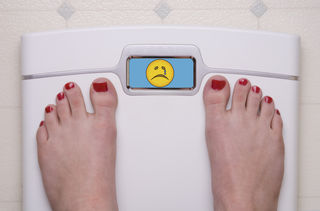Bias
The Pain of Weight Bias Is Real—and Physical
Perceived weight stigma is linked to physical aches and pains.
Posted May 25, 2018

Body shaming hurts, and not just emotionally. Feeling stigmatized because of your weight is associated with increased physical pain, according to a study published online this month in the journal Stigma and Health.
In everyday conversation, we tacitly acknowledge the link between psychological suffering and physical pain by using similar language to describe them; for example, heartache and toothache. And previous research has shown that the sting of social rejection is associated with increased physical pain.
In the new study, lead author KayLoni Olson, Ph.D., and her colleagues looked at the impact of stigma on women who wanted to lose weight. Olson is currently a postdoc research fellow at the Weight Control and Diabetes Research Center in Providence, Rhode Island. Recently, I had a chance to chat with her about the pain that weight bias can cause, sometimes in surprisingly physical ways.
Body weight and bodily pain
“Research has shown fairly consistently that higher body weight is associated with greater bodily pain,” Olson says. Part of that may be due to extra strain on the joints; excess weight is a risk factor for osteoarthritis. In addition, obesity-related inflammation throughout the body is thought to play a significant role.
But that may not be the whole story. “Researchers have found that key areas in the brain responsible for processing physical pain are also involved in processing social pain,” says Olson. This suggests there may be neural overlap in the brain processes behind these two kinds of anguish.
Judged by oneself and others
Olson’s study included 61 women with BMIs in the overweight or obese range. It focused on two types of social pain:
- Perceived weight stigma occurs when people observe or believe that others have made unfair negative assumptions about them based on nothing more than their weight.
- Internalized weight stigma occurs when people come to believe that those unfairly negative assumptions are true. At this point, they may become their own harshest critics. “Those who have internalized weight stigma might believe, based on their body weight, that they actually are lazy or unattractive,” Olson says.
Weight stigma can wreak havoc with a person’s self-esteem. That may have psychological repercussions, including depression, anxiety, and binge eating. Making matters worse, it may sap the energy and motivation needed to eat healthfully and exercise consistently.
The physical toll of weight bias
All of this can be intensely hurtful in more ways than one. To study the relationship between weight stigma and physical pain, Olson looked at a group of women with overweight or obesity who were starting a brief weight management program. As part of their initial assessment for the program, they filled out questionnaires that included questions about bodily pain, weight stigma, and weight bias internalization.
“We found that women who reported perceiving weight stigma more often also reported more bodily pain,” Olson says. “The same was true of those who reported internalizing more weight stigma.”
Ironically, pain itself may only exacerbate a bad mood or low energy. And that may further impede an individual’s desire to engage in the daily lifestyle changes that are important for a healthy weight.
“Unfortunately, there continues to be some degree of acceptability of weight stigma in our society,” says Olson. “Each year, there is more research documenting how it can impact well-being and physical health. But we don’t need to wait for the research to realize that weight-related stigma isn’t doing us any favors.”
References
Olson, K. L., Landers, J. D., Thaxton, T. T., & Emery, C. F. (2018). The pain of weight-related stigma among women with overweight or obesity. Stigma and Health. Advance online publication. doi:10.1037/sah0000137


